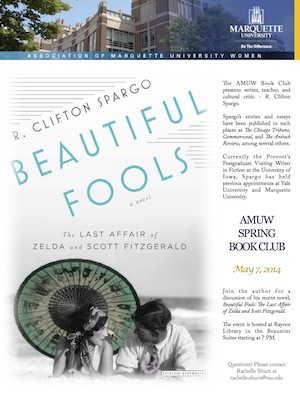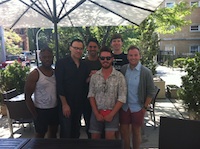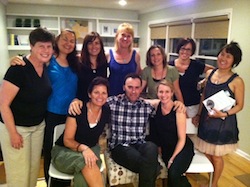Special Offer

A 50% discount is available for book club orders of 10 or more copies ordered through Overlook. Contact: www.sales@overlookny.com
DISCUSSION QUESTIONS FOR BOOK CLUBS
1. In this novel R. Clifton Spargo imagines the missing, final chapter from the lives of two already famous historical figures. Are you drawn to the novel especially for its treatment of the legendary figures of Scott and Zelda? Or would this story of a couple taking one last chance on each other in a foreign land have worked just as well if the characters had been entirely imaginary?
2. The prologue, titled simply “February 12, 1932,” is the only section of the novel that doesn’t occur during the weeklong trip to Cuba in April of 1939. Why did the author choose to include it? What information does it provide that helps you understand Scott and Zelda better?
3. The title of the novel, Beautiful Fools, riffs on the famous words of Zelda after emerging from anesthesia and discovering that she’d given birth to the couple’s only daughter, Scottie. “I hope it’s beautiful and a fool,” Scott recorded his wife saying, “a beautiful little fool.” He attributed the words, in slightly revised form to Daisy Buchanan in The Great Gatsby, who adds, “that’s the best thing a girl can be in this world.” In your opinion, what does it mean to be a “beautiful fool”? And is it a good or bad thing to be in the world as we know it?
4. Zelda was a woman of many talents. She was a brilliant conversationalist, skilled ballet dancer, accomplished visual artist, and witty but also lushly sensuous writer. In what ways did her relationship with Scott enhance her creativity? In what ways did Scott or their marriage inhibit her talents?
5. In Chapter 1, Scott twice fights with Sheilah Graham, the Hollywood gossip columnist who was his real-life girlfriend, about her meddling in his affairs? How much of the fight has to do with Zelda and the letter from her that Sheilah discovered? Was Sheilah wrong to read the letter? Is Scott wrong to react the way he does to her jealousy?
6. Do Scott and Zelda have different goals for this trip to Cuba? What is Zelda hoping will happen for them during this week’s vacation? What about Scott?
7. Authors sometimes speak of setting as a character. We learn much about the place in which a story occurs through what the characters see of their environment. But the setting also acts on the characters and in doing so tells us things about them. Recall some of your favorite books set in foreign lands: e.g., Ernest Hemingway’s The Sun Also Rises (Spain), Paul Bowles’s The Sheltering Sky (North Africa), or Toni Morrison’s Tar Baby (the Caribbean). How important is the country of Cuba to the action of Beautiful Fools? Could this vacation have taken place almost anywhere?
8. In Zelda’s letter to Scott on page 45, she writes, “you were once my religion, or the dream of us was like religion to me, and I cannot altogether believe that faith doesn’t bear fruit.” Faith is a running theme throughout the novel – and it is Zelda who most often thinks in religious terms. In what ways is Zelda a person of faith? Why does she use religious language to describe her relationship with Scott?
9. Even though Scott says to himself at one point that he could never again be in the same room as Ernest Hemingway, he checks Zelda and himself into the Hotel Ambos Mundos, the hotel where Hemingway was known to reside while in Cuba. Scott learns this fact directly from their shared editor, Maxwell Perkins. Is Scott secretly hoping to run into his old friend?
10. Were you surprised to learn that Americans could travel to Cuba with such ease in the first part of the 20th century? At the world famous bar La Floridita — a bar that Hemingway frequented, and where a cocktail was named for him — Scott and Zelda become involved in a conversation about the complex history of the United States’ involvement in the political affairs of Cuba. How much do Scott and Zelda know about the country they’re visiting? And what do their new Cuban friends think about Americans and the foreign policy of the United States?
11. From their very first meeting, Scott admires Matéo Cardoña, and yet he also suspects the Cuban of working an angle? Are Scott’s suspicions justified? Do you think Matéo Cardoña’s motives change over the course of the novel?
12. Señor Famosa Garcia, acting as tour guide for Zelda and Scott, describes the women of Cuba as very religious, insisting that they “save us.” What does he mean by this? Why have women traditionally been the more religious persons in so many cultures? How has religion empowered but also restricted women?
13. What is in the bag that Scott stashes beneath the seat of the car and then throws away at a filling station on the road from Havana to Varadero? Does Zelda really have no idea of what’s in the bag, or is she just pretending she doesn’t know?
14. There are several scenes that highlight Zelda’s playfulness and sense of mischief (for instance, the scene in which she flirts with imaginary sailors while swimming or the picnic scene during which she refers to a note she’s written to Scott but hidden from him). What does it say about Zelda that she’s so fond of these games? And what do these little games tell us about their lifelong love affair?
15. Why are Scott and Zelda so instantly drawn to Aurelio and Maryvonne? And why are the Frenchwoman and Spaniard (he is also a wounded refugee soldier of the Spanish Civil War) attracted to this American couple?
16. Why does Zelda give Scott the St. Lazarus medal at the moment that she does? What is she trying to say to him?
17. When Zelda starts to ask the fortuneteller on p. 232 whether Scott would choose a life by her side over great success in his career, she breaks off, saying she already knows the answer to her question. History tells us that Ernest Hemingway accused his friend Scott of too often putting Zelda first and allowing her to compete with his art. Was it really necessary for Scott to make a choice between his art and Zelda? Why, in your opinion, do so many writers struggle with the conflict between professional and interpersonal excellence?
18. What did Zelda learn from the fortuneteller’s tarot reading that she didn’t already know? Why does Maryvonne’s translation of the fortuneteller’ words trigger such a panicked response in her?
19. Why does Maryvonne admire Scott for trying to break up the cockfight? In your opinion, was it a brave or foolish act?
20. Many explanations have been offered for the different psychological and physical illnesses that afflicted Scott and Zelda as individuals. Did their relationship only make things worse for each of them? Do you think that by today’s standards they would be described as a “codependent” couple?
21. Early in the novel, as Zelda reminisces about childhood, she is described as tomboyish, reckless, and adventurous — so much so that, it seems, she should have been born a boy? How might her life have been different had she been a man? Was she held back as a woman of her era?
22. What actors would you cast as Zelda and Scott in a film version of Beautiful Fools?
AUTHOR Q&A’s

To have R. Clifton Spargo join your book club discussion about Beautiful Fools via Skype, send your request to rcliftonspargo@gmail.com. Subject to availability.

R. Clifton Spargo will be the featured author at the Association of Marquette University Women’s Spring Book Club discussion.

R. Clifton Spargo joins Madame X’s Book Club to discuss Beautiful Fools at the Kit Kat Klub in Chicago, August 18, 2013.

R. Clifton Spargo makes a special live appearance at “Barb’s Book Club” in Arlington Heights, IL, for their discussion of Beautiful Fools.
If your book club has chosen to read Beautiful Fools, send us the name of your book club and meeting date, and we’ll announce it here. Pictures are also welcome.

